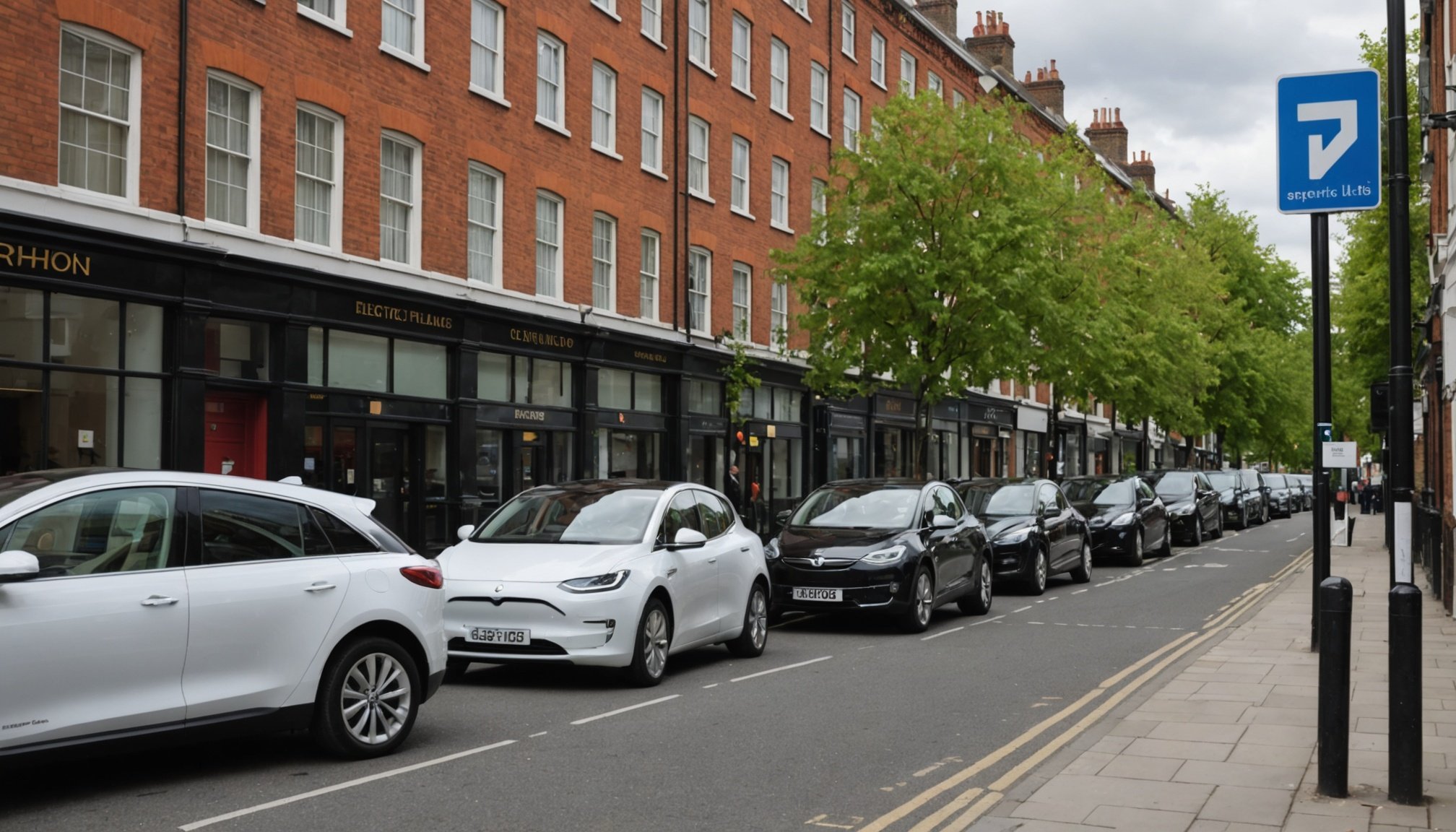Overview of the Electric Vehicle Market in London
The Electric Vehicle Market in London is witnessing remarkable growth. As of late 2023, there are approximately 175,000 electric vehicles (EVs) registered in the city. This surge reflects a broader trend of increasing London EV Adoption, driven by both policy and consumer preferences. Studies predict that by 2030, EVs could account for over 40% of all vehicles in the capital, illustrating significant potential for further growth.
Several factors propel these EV Trends. Stringent emissions regulations and the ULEZ (Ultra Low Emission Zone) expansion play a critical role. As these measures intensify, the appeal of zero-emission vehicles has grown, encouraging more Londoners to switch. Furthermore, government incentives, such as grants and tax benefits, also urge adoption by making EVs more financially accessible to the average consumer.
Also to see : Transforming a Listed Building into a Charming Home in Oxford: A Step-by-Step Guide
Technological advancements in battery efficiency and charging infrastructure are additional contributors. The city has significantly increased its network of charging points, aiming to address range anxiety and offer convenience to EV owners. With growing environmental awareness, Londoners are increasingly prioritising sustainable transport choices, reinforcing the Electric Vehicle Market’s upward trajectory.
Impact on Property Values
The introduction of electric vehicles (EVs) has been noted to influence real estate markets, with homes featuring EV charging capabilities experiencing noticeable property value changes. In examining property value trends, we find a direct correlation between electric vehicle availability and increased demand for homes equipped with charging stations. As more buyers prioritize sustainable living, the presence of EV infrastructure becomes an attractive feature, driving up home prices.
Additional reading : How Recent Flood Plain Reclassifications Impact Property Insurance Rates in Somerset
Several case studies reveal that homes with EV charging capabilities not only sell faster but often attract a premium. For example, properties in urban areas where EV adoption is high display a consistent uptrend in prices. This trend is particularly prominent in metropolitan regions where sustainability and technology-friendly attributes are highly valued.
Experts project that as the adoption of EVs continues to rise, the real estate market will increasingly reflect this shift. Predictively, areas with robust EV support infrastructure could see a significant home price boost. It stands to reason that as EVs become mainstream, the property market will further stratify based on charging accessibility. Thus, prospective homeowners and investors might benefit from considering these trends when making real estate decisions, pairing technological advancements with property investments to maximize returns.
Charging Infrastructure Necessities
The current EV charging infrastructure in London is rapidly evolving to accommodate the increasing number of electric vehicles on the streets. Public charging stations are strategically distributed across the city, offering various charging speeds to cater to different needs. However, while these public solutions are convenient, they do not always provide the most efficient option for all EV owners.
For property owners, particularly those with residential properties with parking, home charging solutions are becoming vital. The ability to charge your vehicle overnight not only ensures a full battery each morning but also avoids the possible inconvenience of waiting at public stations. Home charging offers the comfort of privacy and the financial benefit of off-peak electricity rates, making it an attractive charging solution.
When considering EV charging solutions for home installation, it’s essential to evaluate several factors. Charging stations vary in power output, with Level 2 stations generally recommended for most residential settings. These provide a good balance between charging time and energy consumption. Additionally, compatibility with a homeowner’s electrical system and potential upgrades such as smart charging capabilities are important considerations.
By implementing effective home EV charging solutions, property owners contribute to a more sustainable London while enhancing the convenience of electric vehicle ownership.
Local Policies Affecting EV Adoption
The London EV Policies are pivotal in driving the adoption of electric vehicles within the city. Numerous government initiatives have been implemented to transform the transportation landscape by encouraging the use of cleaner, more efficient vehicles. By focusing on stricter emissions standards and offering incentives such as reduced congestion charges, these policies aim to reduce the environmental impact of traditional combustion engines.
In addition to broader initiatives, regulatory changes concerning residential parking and charging facilities have seen significant advancement. Local authorities are prioritising the installation of public charging stations and incentivising property developers to include electric vehicle charging points in new housing developments. These measures not only enhance access to crucial infrastructure but also ease the adoption of electric vehicles for residents lacking private parking.
In the coming years, future legislative trends look set to further affect EV-related housing developments. There is an anticipated increase in the enforcement of zero-emission zones and stricter regulations that mandate EV charging slots in both residential and commercial properties. A forward-thinking approach by the government is fundamental to fostering an environment conducive to EV growth, ensuring that the necessary support structures are in place to sustain this transition towards greener transport solutions.
Environmental Impacts of EV Surge
The adoption of electric vehicles (EVs) brings considerable environmental benefits, heralding a shift towards reduced emissions. By replacing traditional petrol and diesel vehicles, EVs significantly cut down on greenhouse gases, supporting sustainability efforts. London, grappling with air pollution, sees EV adoption as a crucial step toward achieving cleaner air. With lower emissions per vehicle, the city’s corporate social responsibility and environmental agenda align more closely, enhancing urban air quality.
EVs are not just about immediate benefits. Their growing prevalence can reshape residential areas. Long-term implications include reduced noise pollution and improved living standards. Yet, high EV penetration requires infrastructure adaptation, like the installation of more charging stations, to avoid strain on existing resources. This shift necessitates careful planning to maintain grid reliability and accommodate increased electricity demand.
Also, discussions on EVs often overlook battery production’s environmental impact, a factor crucial for true sustainability. Responsible corporate social responsibility demands addressing this lifecycle challenge, ensuring raw materials are sourced ethically and recycling processes are maximised. Thus, while adopting EVs presents challenges, their contribution to sustainability goals remains overwhelmingly positive when approached holistically, committing to integrating EVs in a manner that considers both immediate and extended environmental effects.
Real Estate Trends Related to EVs
The real estate sector is significantly influenced by the rise of electric vehicles (EVs). As real estate trends evolve, developers and planners are adapting to accommodate the unique needs introduced by these innovations.
Market Adaptation
Real estate developers are increasingly integrating market adaptation strategies to cater to the growing demand for EV-friendly homes. This includes incorporating charging stations and designing housing developments that consider the electrical infrastructure required to support multiple EVs. Consequently, developers who anticipate and respond to these trends position themselves advantageously.
Future Housing Developments
New housing projects are emerging with built-in EV features, such as home garages equipped with fast chargers. These developments not only provide convenience for electric vehicle owners, but also enhance property value. Incorporating these amenities reflects a broader shift towards sustainability and tech-savvy living environments.
Market Shifts
The integration of electric vehicle amenities is prompting a noticeable market shift. As the appeal of sustainable living grows, homes with EV capabilities are becoming more attractive to buyers, potentially affecting property values and resale potential. Communities that embrace this trend are expected to benefit from increased interest and investment, further reinforcing the importance of adapting real estate to future-proof housing preferences.











